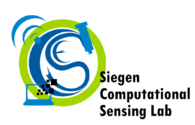Computational Sensorics / Communication Engineering (CSE) » Thesis Topics
Thesis Topics
Please below a list of thesis topics offered by the chair of Computational Sensing/Communications Engineering.
Specific Topics
2024-08-30: MSc. thesis “Methods for automated calibration of car headlights” in cooperation with Hella GmbH (thesis in conjunction with paid internship) – contact: Ivo Ihrke
Generic Topics
The chair offers varying thesis topics (M.Sc., B.Sc., study project) in the areas of
- computational optical microscopy – this area includes experimental and/or computational aspects of computational microscopy, e.g. inverse problems, reconstruction algorithms, simulation algorithms, experimental setups, automation of experimental protocols, data improvement, etc.
- computational electron microscopy – this area currently includes simulation and inverse simulation studies, the latter, e.g. with the help of differentiable rendering, a machine learning technique
- plenoptic imaging – this area includes light field, spectral, polarization, high-speed and high dynamic range imaging and/or combinations thereof. A typical project will create a setup, capture data and develop processing and/or calibration schemes for the experimental setting.
Contact: Ivo Ihrke
Radar Topics
The chair offers in cooperation with Fraunhofer FHR following master thesis topics:
- Researching the fundamentals of RF SIGINT from LEO Satellites – The project aims to research the fundamentals of being able to receive ground- and air-borne sources of RF emissions from a cluster of Low Earth Orbit (LEO) satellites. The primary goal is to determine the update-rate requirements for effective localisation of diverse RF radiating sources (defined during the project).
- Use of Artificial Intelligence (AI) to identify sources of RFI in raw SAR data – Radio Frequency Interference (RFI) can severely degrade the performance of radio-telescopes and radar systems. For example, a source of RFI that is “in-band” to a Synthetic Aperture Radar (SAR) can potentially degrade the resultant SAR-image quality. Therefore, it is important to identify sources of RFI and to mitigate its deleterious effects. The project is less concerned with the mitigation and suppression of RFI in SAR data, rather the objective is to detect RFI within raw SAR data and to attempt to classify it.
- Receiver Self-Localisation using GEO Satellites – This project concerns the development of a receiver (Rx) self-localisation method that uses GEO satellites as RF sources. Requisite measurements to obtain GEO signals may be performed at Fraunhofer FHR.
Contact: Daniel W. O’Hagan
Aktualisiert um 4:34 PM am 2024-08-30 von ii164652



